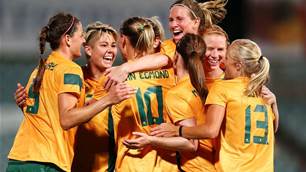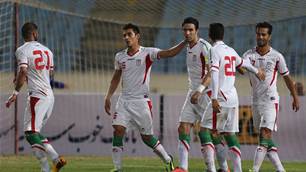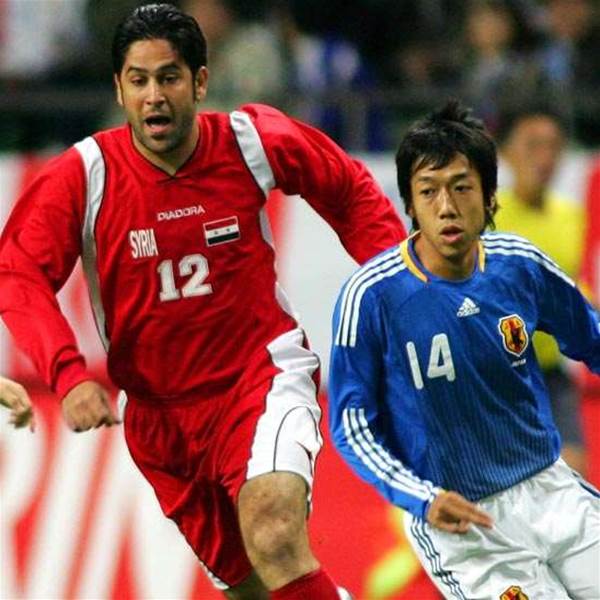POWERHOUSES Japan and Saudi Arabia should progress in a group containing minnows Syria and Jordan. However, if either of the unfancied west Asian nations manage to snag a win against the big guns of the group, it will blow qualification wide open.
Saudi Arabia
A little over a year ago, Saudi Arabian football was at an all-time low.
Looking to qualify for their fifth World Cup finals in a row, the Saudis lost a seemingly straightforward AFC playoff against Bahrain to conclude a downward spiral which included three head coaching changes and some abject performances during the final round of World Cup qualifying.
The national team was in disarray and first step in restoring pride showed unusual restraint on the part of the Saudi FA. Going against a trend of being trigger happy with under performing coaches - they've had 12
in 16 years - Portuguese Jose Peseiro was retained despite the bad run of results.
With a place in the 2011 Asian Cup assured due to their runners-up finish in 2007, the Saudis had to make do with a series of friendlies to fine tune the squad and Peseiro's first task was to settle on a core of players to call upon after much chopping and changing under previous coaches.
One of his first decisions coaching decisions was to drop influential players Mohammmed Al-Shalhoub and Mohammed Noor, the latter widely considered one of Saudi Arabia's best-ever players. The 32 year-old Noor had been enjoying a renaissance at Al Ittihad over recent years, but was seen as surplus to team requirements moving forward. He quickly announced his retirement by saying: "It's obvious that the coach doesn't think about football when he assembles his squad. The decision to leave me out of the team is a political one."
In Noor's absence, the responsibility for the team's success on the pitch falls to possibly it's biggest enigma: Yasser Al Qahtani. A proven goalscorer for both club and country - scoring 59 goals in 94 international appearances - the 28 year-old went off the boil during the ill-fated World Cup qualifying campaign. However, this season he's regained his form, helping club side Al Hilal to the ACL semi-finals. Just which player will turn up for the Green Falcons in January will go a long way to determining how far the Saudis will progress.
The team is strongest up front, with forward Mohanned Aseeri in particularly good form during a 4-0 rout of Uzbekistan. Keep an eye on 21 year-old striker Naif Hazazi, who stepped into the void Al Qahtani vacated during World Cup qualifying. A precocious young talent, the Al Ittihad frontman has averaged a goal every second game since bursting onto the international scene in November 2008 and could be a key man in Peseiro's side.
The Saudis won't be lacking on confidence going into this tournament, after narrowly losing to Spain 3-2 in a pre-World Cup clash and then beating Togo, Gabon and Uzbekistan in subsequent warm-ups.
Star Man
At just 28 years of age, the Al Hilal striker Yasser Al Qahtani is the star of Saudi football at the moment. With a ratio of more than a goal every two games for the Green Falcons and co-winner of the Golden Boot in the 2007 Asian Cup, Al Qahtani has bounced back from a poor showing in 2010 World Cup qualifying to find his cutting edge again.
The Coach
Jose Peseiro - Former Real Madrid assistant Peseiro is the latest on the Saudi coaching hotseat, one which has seen three coaches during 2010 World Cup qualifying alone. Lucky to keep his job after failing to qualify for South Africa, the Portuguese coach will be looking to steer the 'Sons of the Desert' to their first Asian Cup success since 1996 with a mix of young talent and veteran leadership. He will need to avoid fulfilling his reputation for losing his dressing rooms and the players' respect though.
FourFourTwo predicts...
In reality, Syria and Jordan are just making up the numbers in the group, so expect to see the 'Sons of the Desert' battle it out with Japan - in a repeat of the 2000 final - for first place in Group B.
Japan
While Australia may possess the number one ranking in Asia, Japan are the true behemoths of the continent after four successive World Cup finals appearances.
The Samurai Blue have also won three of the last five Asian Cups and considering their performances in the recent World Cup in South Africa, plus their overall experience in taking on various Asian nations, they will touch down in Qatar as favourites ahead of the Socceroos.
Despite a poor set of World Cup 2010 lead-in results, where they were convincingly beaten by Serbia, Korea Republic and England, a totally different side turned up in South Africa to beat Cameroon, Denmark and be narrowly edged out by eventual finalists Netherlands during the group stages.
A defeat on penalties to Paraguay ended their South Africa foray after a goalless stalemate where they blocked out an attacking South American team for 120 minutes. In qualification for the 2011 Asian Cup they topped their group with five wins out of six, smashing 17 goals in the process.
What we learned from South Africa is that Japan are a well organised side, with a few genuine sparks of flair and brilliance that will win them games.
That stability at the back comes from centre-back pairing of Tatsuya Tanaka and Yuji Nakazawa, where the latter has some 110 caps to his name. That aforementioned dazzling flair isn't in short supply either with World Cup star Keisuke Honda, midfielder Yasuhito Endo, Bundesliga right winger and national team captain Makoto Hasebe, plus strikers Shinji Okazaki and Yoshito Okubo.
Japan have a good spread of domestic based players from the strong J.League alongside European-based stars like Honda, Hasebe, right-wing back Atsuto Uchida and midfielder Shinji Kagawa who both play in Germany, plus Yuki Abe who signed for English Championship side Leicester in August.
The team is technically superb, pose a massive threat from their wing-backs and are so deadly from set-pieces that conceding fouls around the penalty box should be avoided at all costs, as they highlighted
in South Africa.
The biggest change post-South Africa was the exit of coach Takeshi Okada, who shot to cult status in South Africa with his stony-face on the sideline seemingly oblivious to the drama on the field. However, in came Italian Alberto Zaccheroni to continue his good work.
Zaccheroni, who spent his first two Japan games in the stands due to visa problems, has made an unbeaten start which has seen Samurai Blue draw with Korea Republic, and beat three South American sides, firstly getting revenge over Paraguay, then toppling Guatemala followed by an historic victory over Argentina - the first time Japan had beaten a top 10 ranked side since 2004.
Star Man
It is not just for the purposes of a pun that we state Keisuke Honda has a great engine on him. He can score, create and play in a variety of positions. His two goals in South Africa proved his star quality.
The Coach
Alberto Zaccheroni - The 57 year-old Italian may be short on Asian experience, but managing 13 different teams in Italy over the past 27 years should hold him in good stead. Those clubs have included the likes of Juventus most recently, Torino, Inter, Lazio plus AC Milan where he won a scudetto in 1999. His ability to transfer that Italian style, where he is famous for playing a unique take on 3-4-3, and experience into the Asian arena will be the next test for "Zac" though.
FourFourTwo predicts...
As the region's best team, anything less than the final will be a disappointment, so expect to see Japan in the last game of the tournament.
Continues on next page...
Related Articles

Asian Cup - one year to go

Matildas draw world champs Japan in Asian Cup













